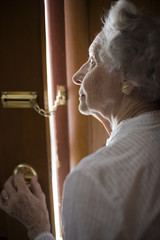As we age, maintaining safety in our living spaces becomes increasingly important. For older adults, ensuring a secure environment is crucial for preventing accidents, managing health conditions effectively, and maintaining overall well-being. This comprehensive guide provides practical advice on preventing falls, managing medications safely, making home modifications, and enhancing personal security.

Enhance the safety of seniors with practical security tips. From installing easy-to-use locks to reinforcing doors and windows, these steps help ensure seniors stay safe and independent at home.
Ensure seniors have easy-to-use locks and door handles that provide both convenience and security. Lever-style handles and smart locks reduce physical strain while maintaining a high level of protection.
Routine maintenance of security systems ensures that alarms, cameras, and locks are functioning properly, giving seniors peace of mind knowing their safety measures are always in working order.
Adequate lighting around doorways, combined with security features like motion detectors, helps seniors feel safe and reduces the risk of falls or security breaches when entering or leaving the home.
Senior-friendly locks, such as lever handles and keyless systems, offer convenience and security. These easy-to-use solutions help seniors maintain independence while keeping their homes safe and protected.
Lever-style door handles are easier for seniors to use than traditional round knobs, especially for those with arthritis or limited hand strength. These handles require minimal effort to open, providing both convenience and safety.
Keyless smart locks eliminate the need for physical keys, which can be easily misplaced. Seniors can use a keypad, smartphone, or even a fingerprint to unlock doors, providing easy access while maintaining security.
Installing deadbolts with easy-turn thumb latches ensures that seniors can lock and unlock doors securely without exerting too much force. These locks offer an extra layer of protection against break-ins.
We offer a range of security solutions designed specifically for seniors. From easy-to-use smart locks and reinforced doors to emergency lockout services, our goal is to enhance safety and peace of mind. Our senior-friendly products and services make home security simple, ensuring that seniors can maintain independence while staying protected.
At Safe and Secure Locksmith, we install smart locks that allow seniors to lock and unlock their doors without needing keys. This is ideal for those with mobility challenges or memory concerns, as keyless entry systems can be operated via a smartphone or keypad, providing both convenience and added security.
Seniors are often more vulnerable to break-ins. Our locksmiths at Safe and Secure Locksmith can reinforce entry points by installing high-security locks, deadbolts, and window locks. These upgrades prevent unauthorized access and significantly improve overall home security.
We offer rapid emergency lockout services to assist seniors who may accidentally lock themselves out. Our quick response ensures that they’re not left stranded or vulnerable outside their homes.
Our team can help seniors by organizing spare key solutions, such as storing a key with a trusted neighbor or in a secure lockbox. This ensures that access to their home is always available in case of a lost or misplaced key.
We offer tailored alarm systems and security integrations, including motion detectors and real-time alert systems, to provide seniors with enhanced peace of mind and protection from any suspicious activity.
We specialize in installing easy-to-operate door handles and locks for seniors with arthritis or limited hand strength. Lever-style handles and push-button locks reduce the effort needed to open or secure doors, ensuring safety and convenience.
Our team has decades of experience providing locksmith services to businesses, ensuring that we can handle any security challenge that comes our way.
Our locksmiths are fully trained to install, repair, and maintain a wide range of commercial security systems, from traditional locks to modern access control systems.
We understand that emergencies can happen at any time. That’s why we offer round-the-clock locksmith services, ensuring that your business is protected day and night.
No two businesses are the same, which is why we provide tailored security solutions designed to meet the specific needs of your property and operations.
Ensuring the safety of seniors at home is vital for their security and independence. By using simple yet effective solutions like smart locks, reinforced doors, and emergency planning, seniors can enjoy peace of mind and feel more secure. Regularly assess safety measures and upgrade when necessary to maintain a safe and comfortable living environment.
Ensure the safety and security of your home with senior-friendly solutions. Contact us today for expert advice and personalized services to keep seniors safe, secure, and independent at home.